Kharjikaayi | Deep fried sweet dumplings

By Usha Hegde, Puttanamane
Kharjikaayi, a deep fried sweet dumpling, is similar to fried modaka and is made on Ganesh Chaturthi. Making outer crust dough and sweet filling for kharjikaayi is same as for fried modaka. However, unlike modaka, for kharjikaayi sweet filling dry coconut can be used. Fried modaka and kharjikaayi differ in shape, and kharjikaayi is crispier than modaka because of its shape.
Note: Images are for larger quantity. Please use measure as mentioned in the ingredients section.
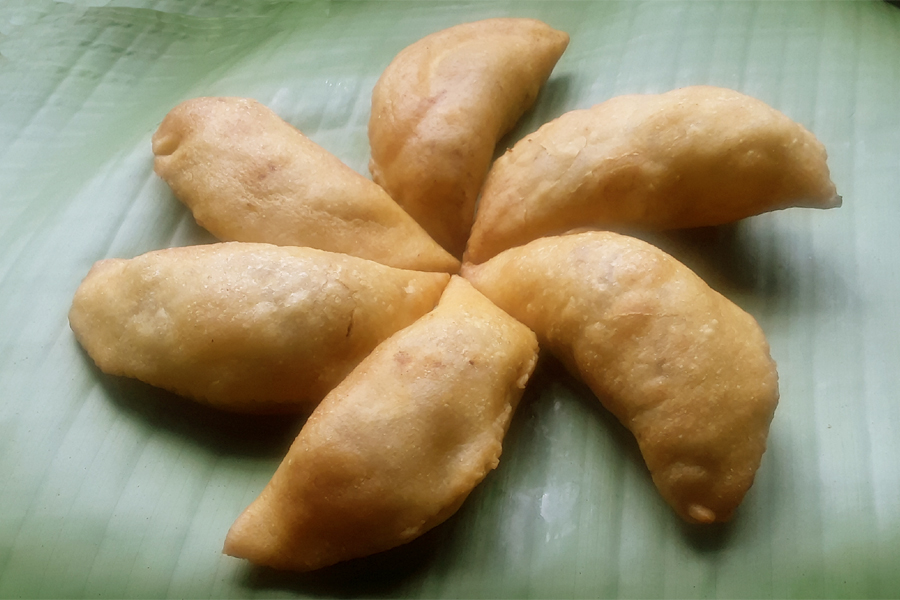

Prep time
30 mins
Cook time
30 mins
Cool off time
0
Total time
1 hour
Course
Sweets
Diet
Vegan, Vegetarian
Difficulty level
Moderate
Servings
12 Kharjikaayi
Ingredients
-
Coconut oil as required for frying
For the outer crust dough:
- 2 cups Bombay or fine rava (suji / semolina)
- 1 teaspoon jaggery or sugar (this is for crispiness)
- Salt as required
-
Water as required
For the sweet stuffing:
- 1.5 cups freshly grated coconut – tightly packed
- ¼ cup white sesame seeds (Ellu / Til)
- 6 cardamoms
- 1.5 cup jaggery or add as required
Cookware / Utensils
-
Thick pan(s)
- Bowl(s)
- Spoon
- Frying or slotted spoon
- Colander
- Rolling board and rolling pin
- Coconut grater
- Kharjikaayi cutter tool
- Mortar and pestle (optional)
Instructions
Instructions
Make dough
- Boil water.
- Take 2 cups rava in a mixing bowl. Add 1 teaspoon jaggery, and salt as required.
- Add hot water as required and mix well.
- Do not knead the dough. Just mix well, cover and keep aside for about 30 minutes. The dough should be firm.
Make sweet stuffing
- Grate 1.5 cups fresh coconut.
- Rinse ¼ cup sesame seeds until clean if not cleaned and dried earlier.
- Remove the cardamom seeds, rinse, and powder them.
- Take jaggery in a thick bottomed vessel or pan.
- Add freshly grated coconut, sesame seeds, and cardamom powder. Mix well.
- On a medium heat, stir and cook them for about 10 minutes or until the jaggery loses its liquid consistency and get mixed well with other ingredients.
- Cover and keep aside. Let it cool.
Shape and fry Kharjikaayi
- Pinch a small portion from the dough and roll it in your palms to make a smooth ball.
- With a rolling board and pin, gently roll to a thin round shape. While rolling, you can use dry wheat / sorghum flour to dust the dough ball or spread little oil on the rolling board surface.
-
Place 2 tablespoons of the filling in the centre.
You can divide both the filling and the dough into 12 to 15 equal parts beforehand. - Fold and gently press the edges.
-
Take kharjikaayi cutter tool and roll it on the edges to give a good shape.
This is optional. You can just seal the edges properly and fry them. - Remove the extra dough. Add this extra dough to next one.
- Heat the oil as needed in a thick pan or vessel.
- Place kharjikaayi in medium hot oil.
- Turn over each kharjikaayi a few times or as needed with a frying or slotted spoon and make sure all the sides are cooked properly.
- Remove kharjikaayi when they look crispy and golden.
- Place them on a colander to drain excess oil.
- Make sure to place a colander on a plate or bowl so that the excess oil will get collected in that plate or bowl.
- Offer kharjikaayi to Ganesha. Serve / eat during festive meal.
- Store the rest in a container with a tight lid.
Step by step guide
How to make Kharjikaayi
Make dough
1. Boil water.

2. Take 2 cups rava in a mixing bowl. Add 1 teaspoon jaggery, and salt as required.
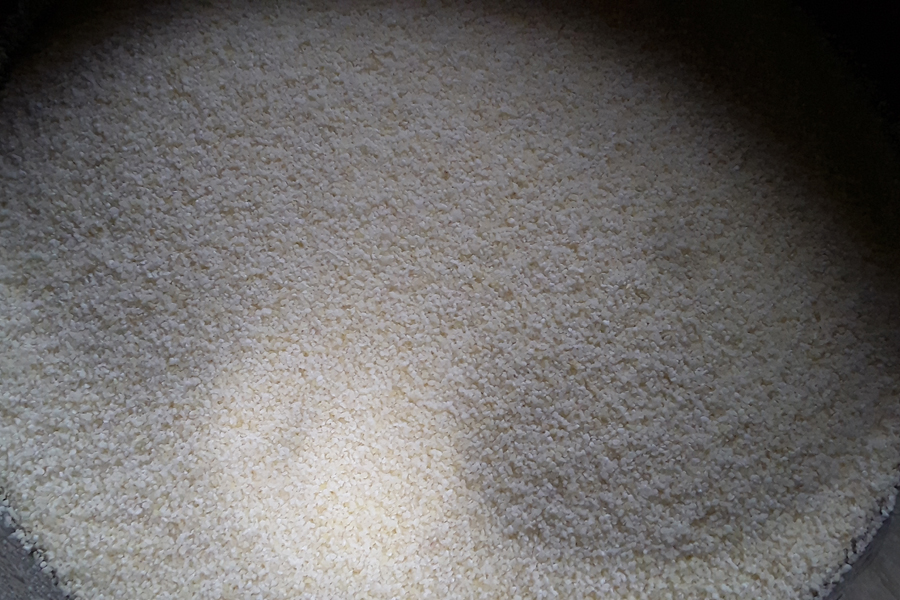
3. Add hot water as required and mix well. Do not knead the dough. Just mix well, cover and keep aside for about 30 minutes. The dough should be firm.
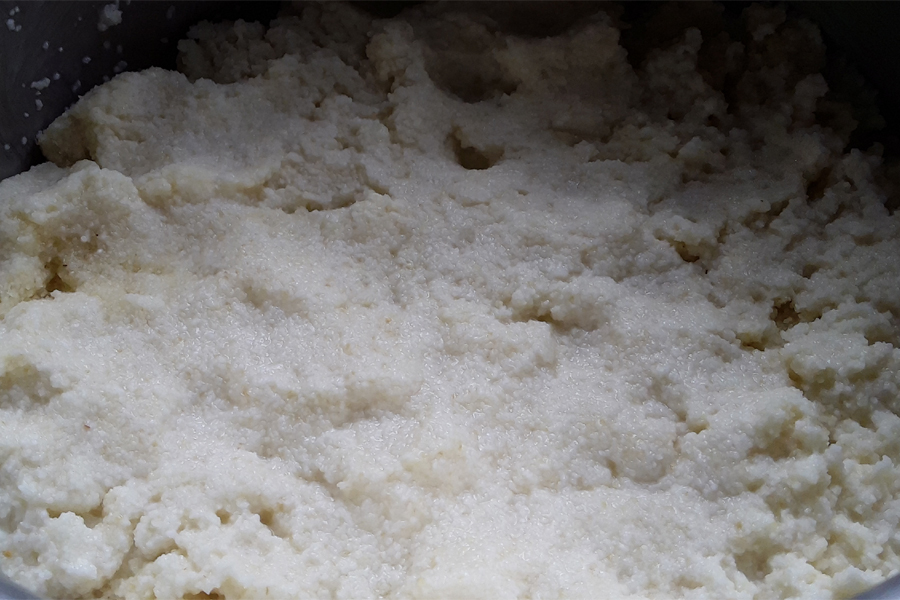
Make sweet stuffing
4. Grate 1.5 cups fresh coconut. Take ¼ cup sesame seeds. Rinse them until clean if not cleaned and dried earlier. Remove the cardamom seeds, rinse, and powder them.

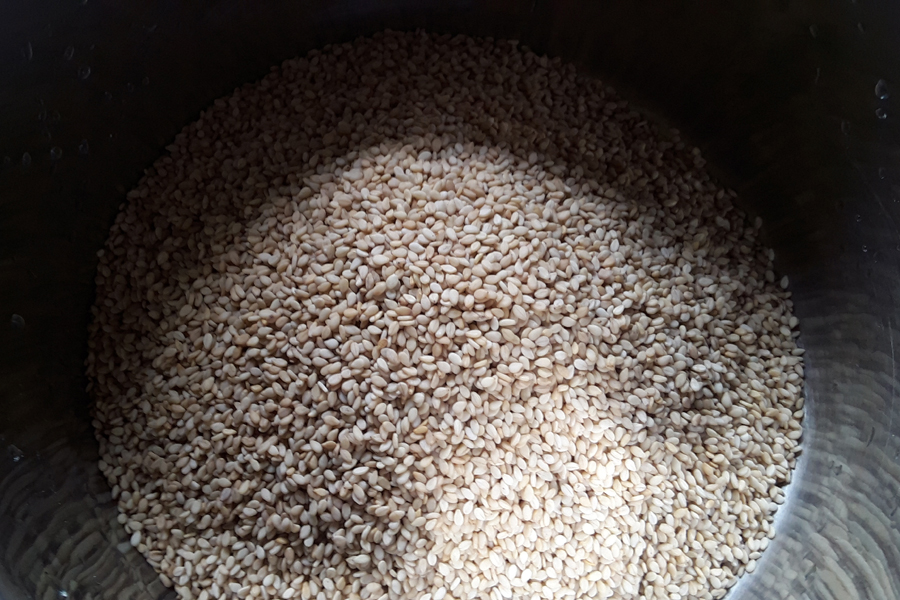

5. In a thick bottomed vessel or pan take jaggery, freshly grated coconut, sesame seeds, and cardamom powder. Mix them well.
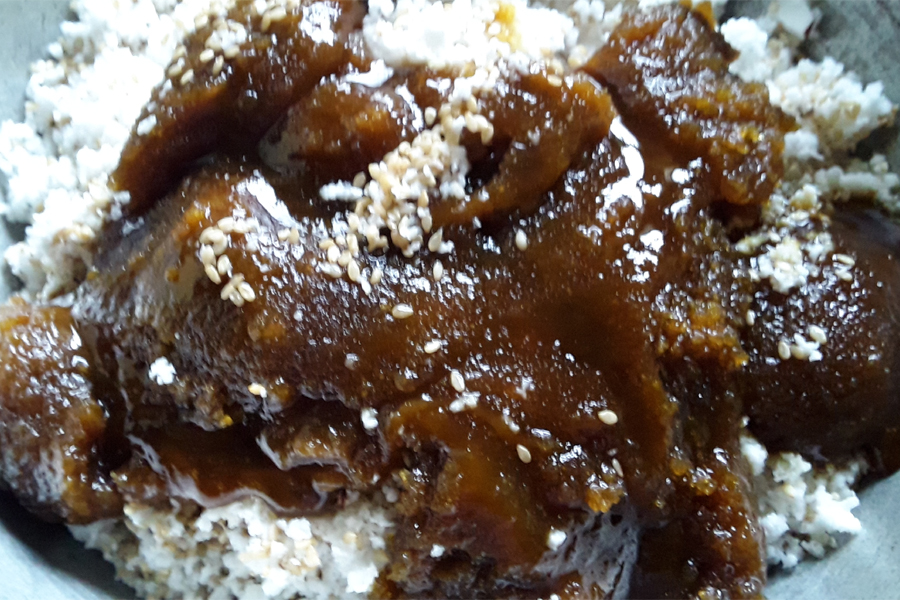
6. On a medium heat, stir and cook them for about 10 minutes or until the jaggery loses its liquid consistency and get mixed well with other ingredients. Cover and keep aside. Let it cool.
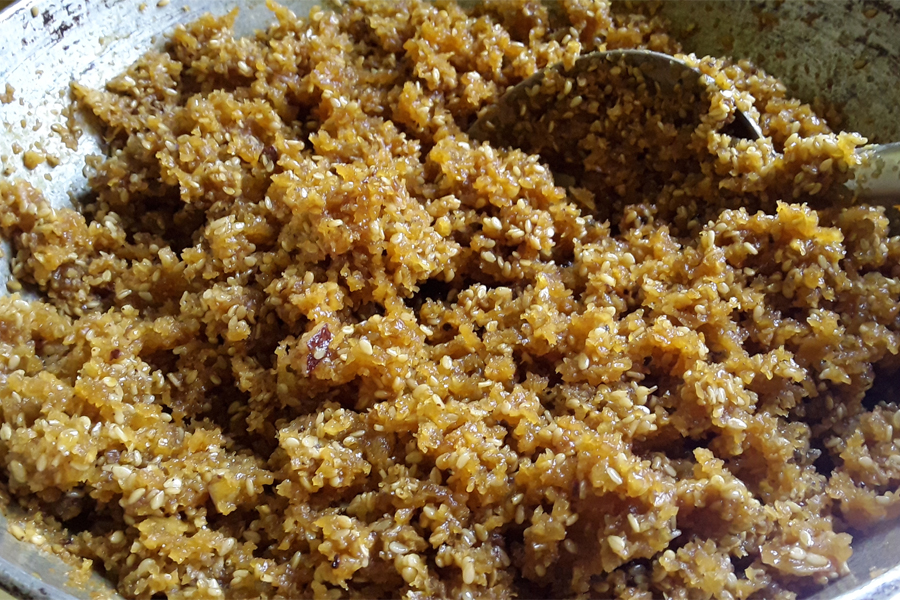
Shape and fry Kharjikaayi
7. Pinch a small portion from the dough and roll it in your palms to make a smooth ball.

8. With a rolling board and pin, gently roll to a thin round shape. While rolling, you can use dry wheat / sorghum flour to dust the dough ball or spread little oil on the rolling board surface.
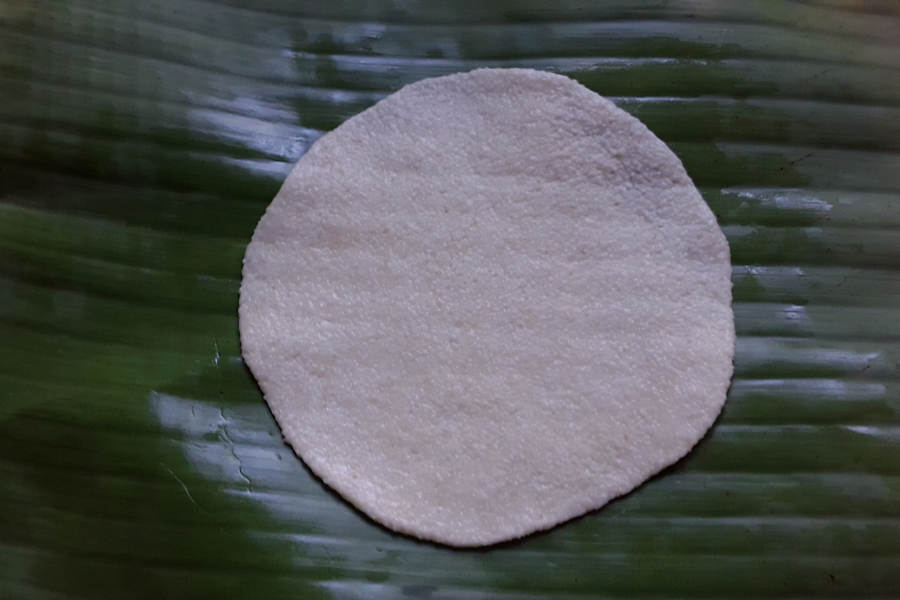
9. Place 2 tablespoons of the filling in the centre.
You can divide both the filling and the dough into 12 to 15 equal parts beforehand.

10. Fold and gently press the edges.

11. Take kharjikaayi cutter tool and roll it on the edges to give a good shape.
This is optional. You can just seal the edges properly and fry them.

12. Remove the extra dough. Add this extra dough to next one.
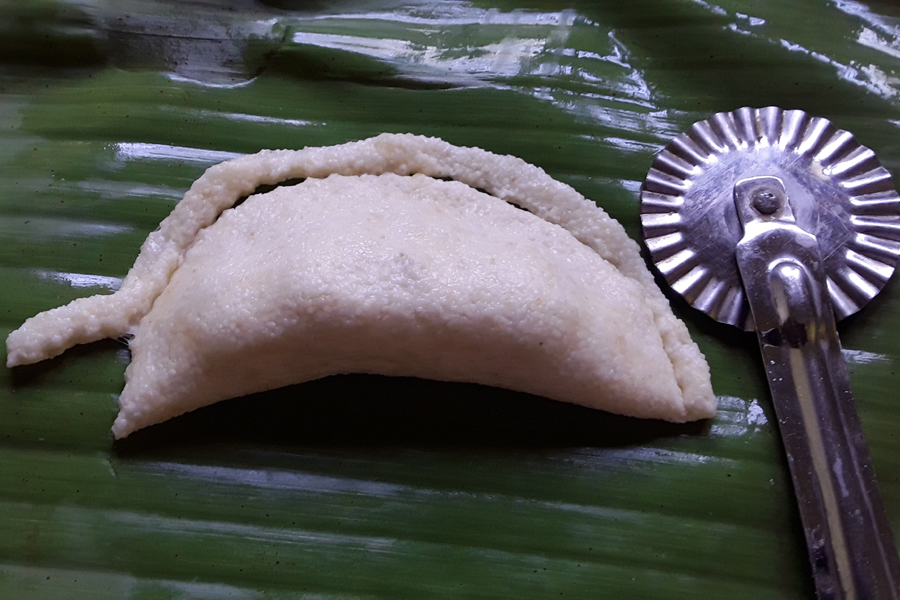
13. Heat the oil as needed in a thick pan or vessel. Place kharjikaayi in medium hot oil. Turn over each kharjikaayi a few times or as needed with a frying or slotted spoon and make sure all the sides are cooked properly.

14. Remove kharjikaayi when they look crispy and golden. Place them on a colander to drain excess oil. Make sure to place a colander on a plate or bowl so that the excess oil will get collected in that plate or bowl.

15. Offer kharjikaayi to Ganesha. Serve / eat during festive meal. Store the rest in a container with a tight lid.

Notes
-
The dough
Rava (semolina) can be replaced with whole wheat flour. If you prefer, you can use 1 cup of whole wheat flour and 1 cup of rava. However, wheat flour might not give needed crispiness to kharjikaayi.
The outer crust dough should be firm and stiff. Do not knead the dough like a rotti / roti dough. If the dough is soft the crust will also be soft and not crispy.
Over time, while making the kharjikaayi, if the dough becomes dry, sprinkle some hot water and mix.
Some rava (semolina) varieties make the dough too soft. In this case add 2-3 tablespoons of Sorghum / Jowar flour (Jolada hittu) to the dough and mix well. Sorghum flour adds crispiness to the Kharjikaayi crust.
-
The filling / sweet stuffing
Dry / desiccated / shredded coconut can be used for the filling, but it tastes different than fresh coconut.
If you are using dry / desiccated / shredded coconut with powdered jaggery, add little water to mix them while cooking.
Make sure to cook the filling properly on medium heat. There should not be any liquid consistency to the filling mixture.
-
Frying Kharjikaayi
Normally, homemade or fresh coconut oil is used to fry kharjikaayi. You can use any oil of your choice. The remaining oil is not good to reuse for any cooking purpose, so add oil wisely as needed while frying.
Fry kharjikaayi in medium hot oil. Frying in not hot oil makes kharjikaayi absorb more oil. Very hot oil will make the kharjikaayi undercooked.
If the kharjikaayi opens up during frying, switch off the heat once the kharjikaayi that are already in the oil fried, carefully strain the oil and discard any filling that may have spilled, and then continue to fry again. Otherwise the filling will get burnt and will get stuck on every kharjikaayi that you fry later. To avoid this make sure to join / seal the kharjikaayi edges well without any opening.
Kharjikaayi stays good for about 2 weeks. However, the shelf life depends on ingredients quality, weather conditions, storage, etc.
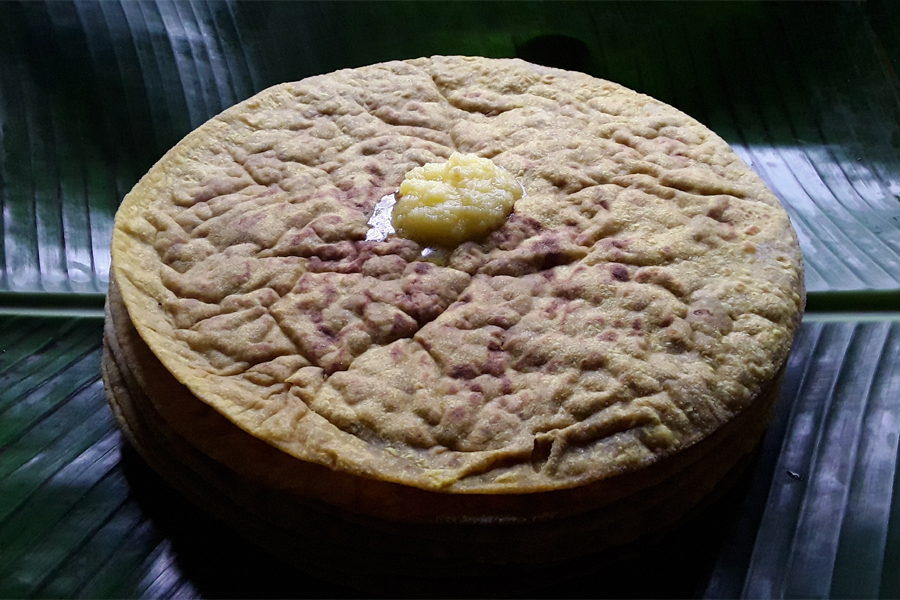
Halasina beejada Holige | Jackfruit seeds Holige
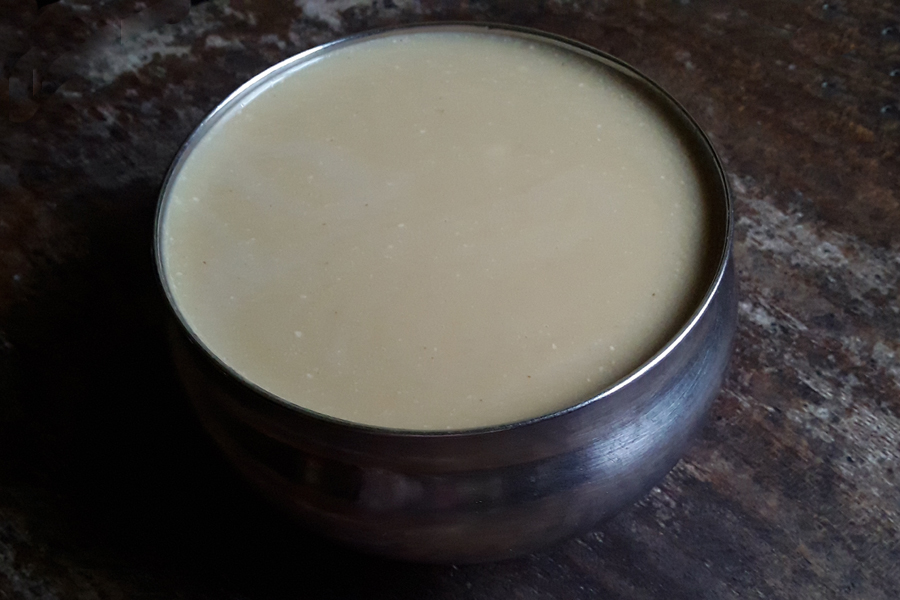
Gasagase paayasa | Poppy seeds kheer
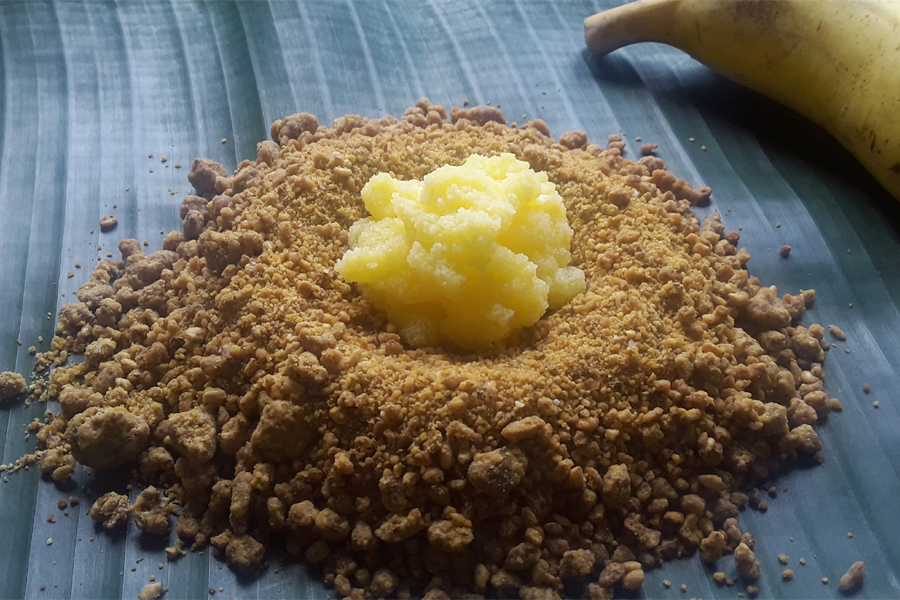
Panchakajjaya | Fivefold sweet mixture
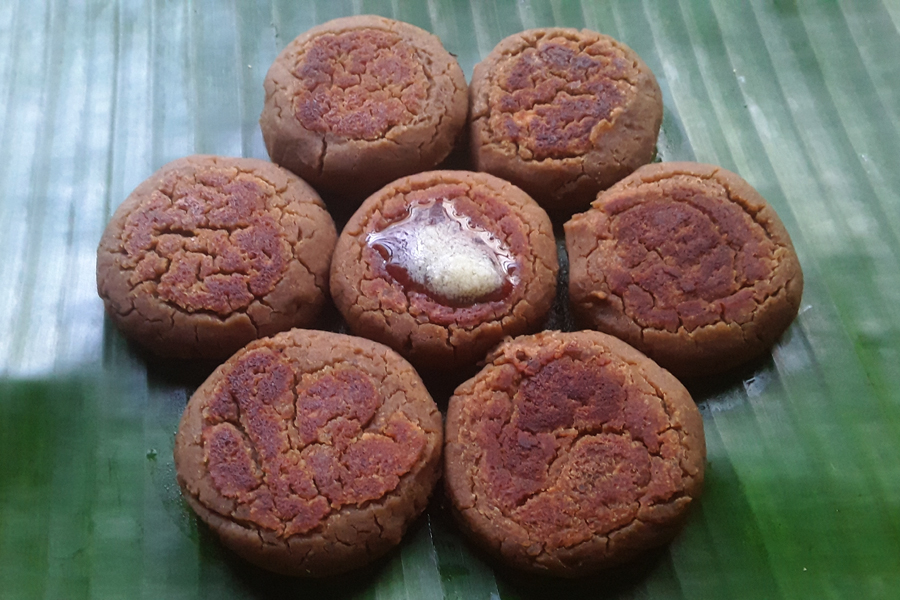
Obbattu | Jackfruit seeds sweet patty
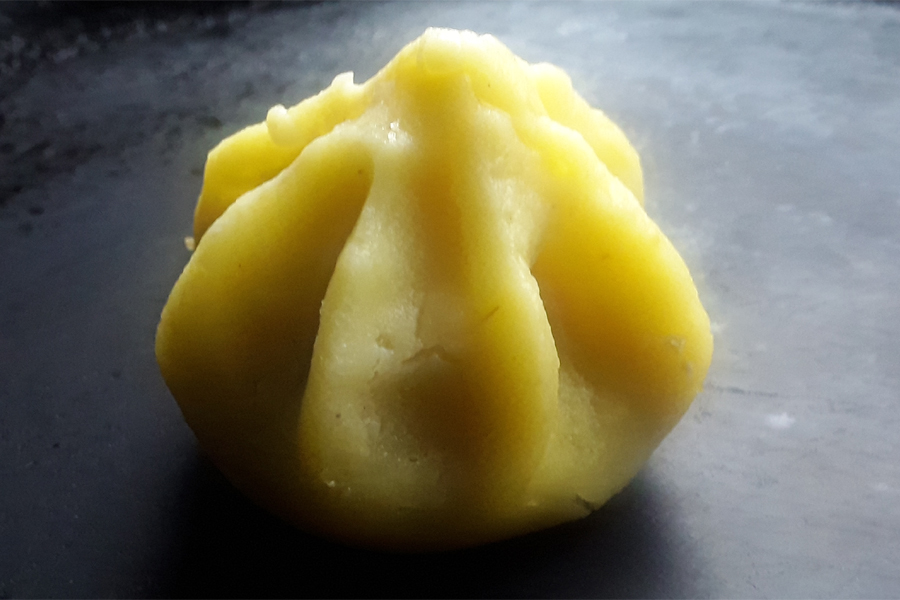
Modaka | Steamed sweet dumplings
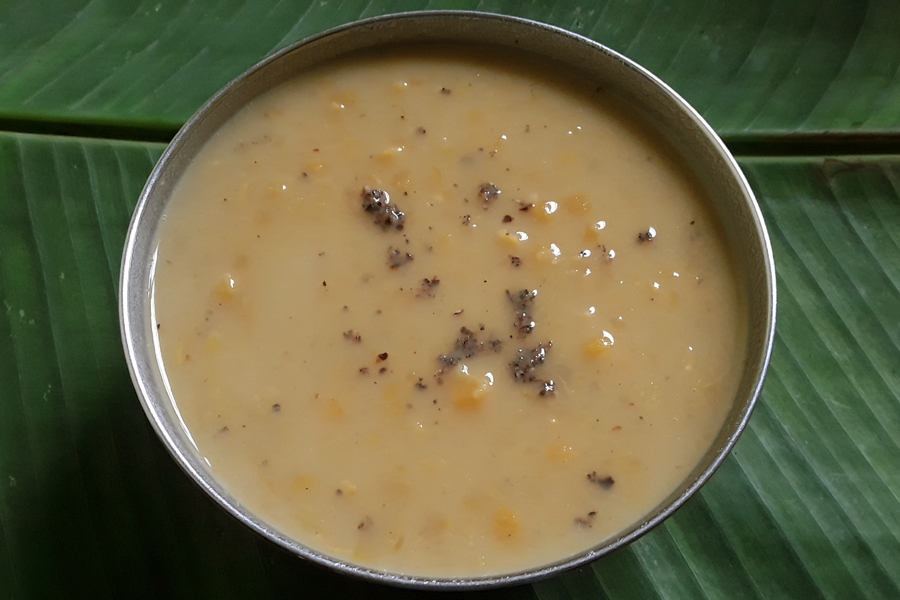
Kadle bele paayasa | Chana daal kheer
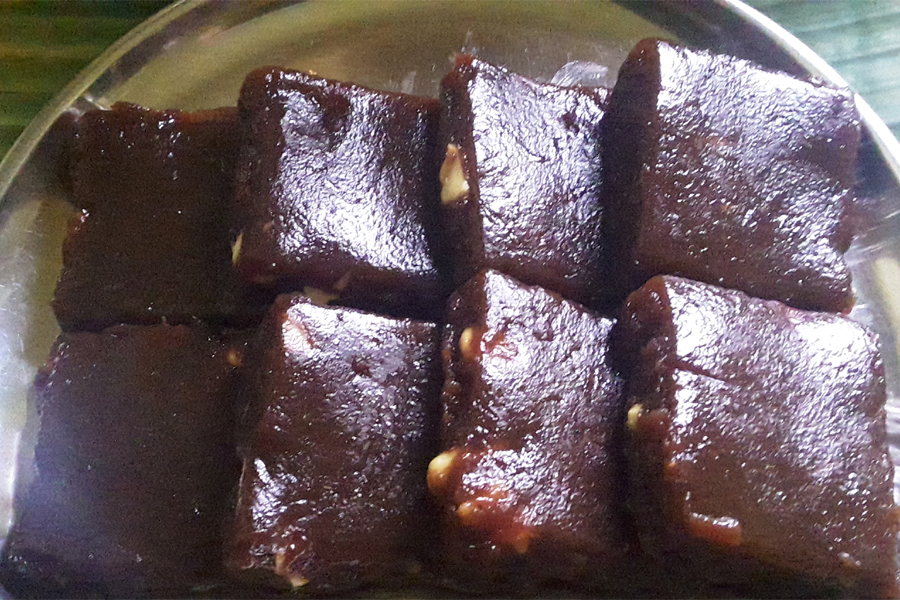
Balehannina halwa | Banana fudge

Kharjikaayi | Deep fried sweet dumplings
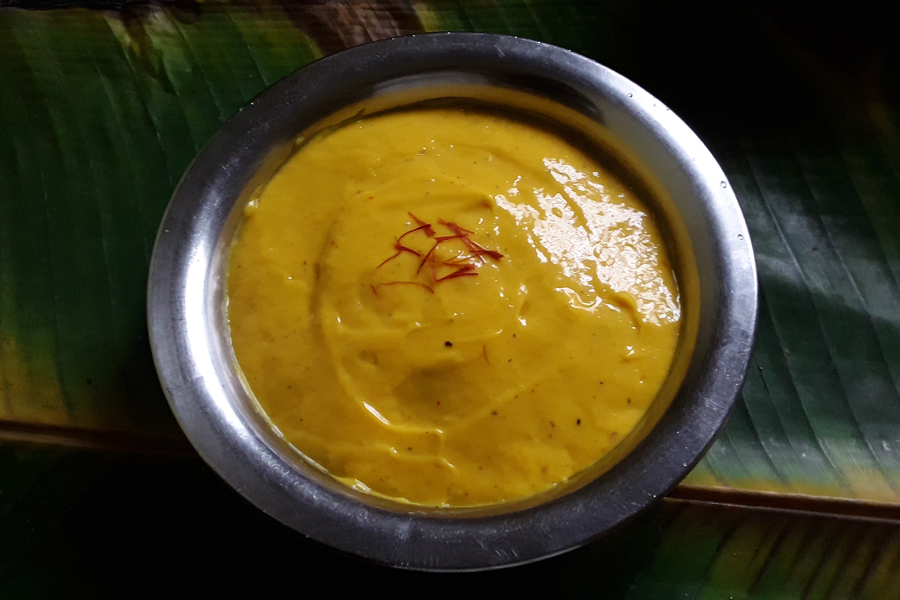
Amrakhand | Mango flavoured curd dessert
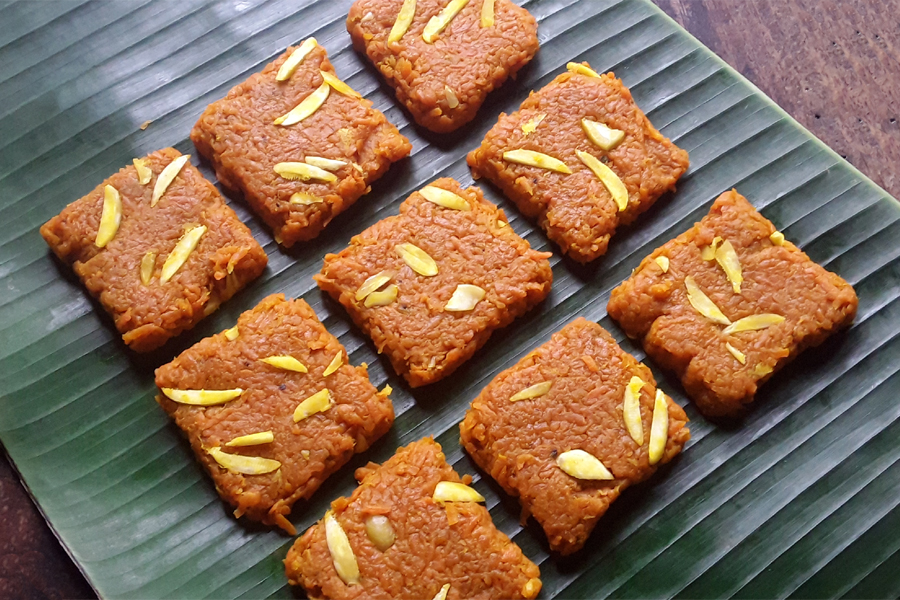
Gajari halwa | Carrot burfi
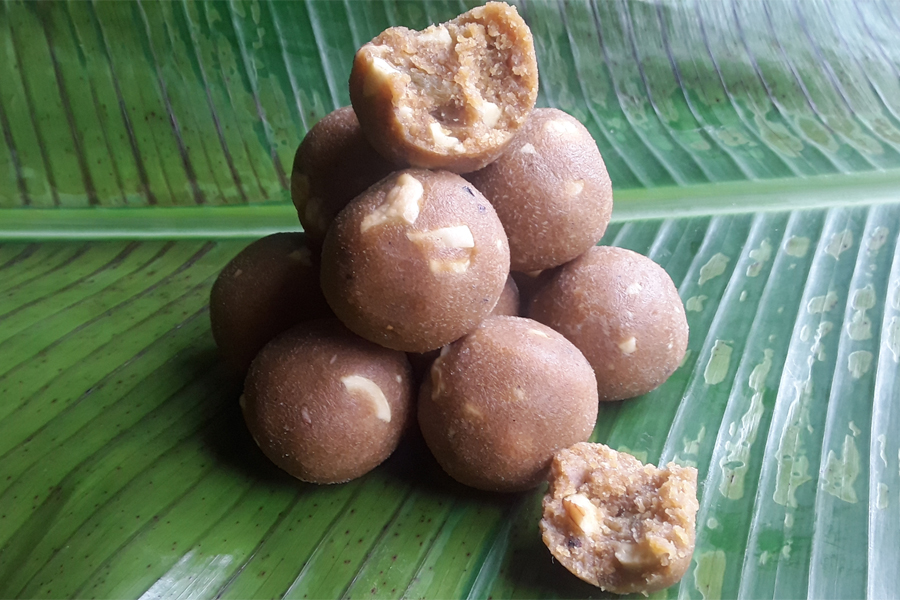
Hittinunde | Atta or wheat flour laddu
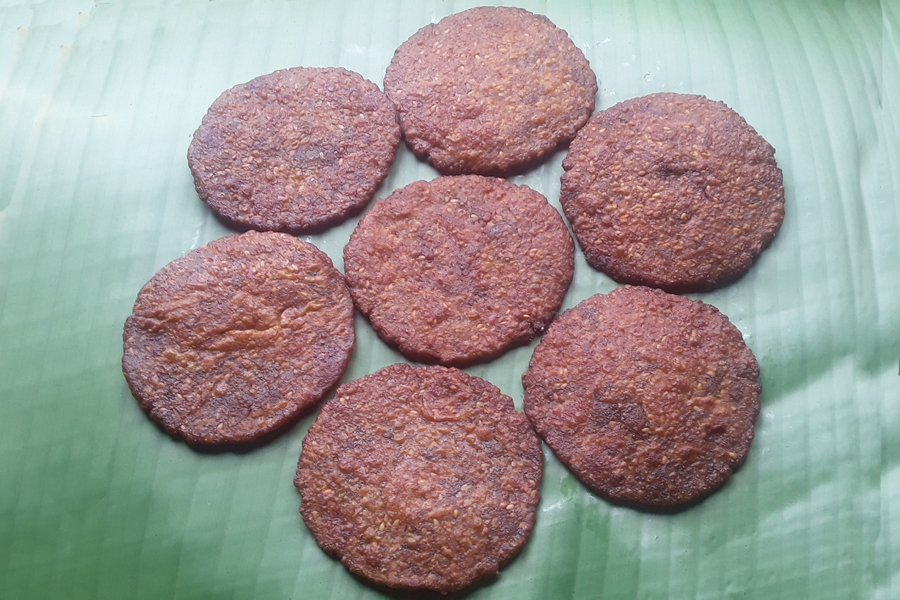
Atraasa or Atirasa | Fried sweet cake
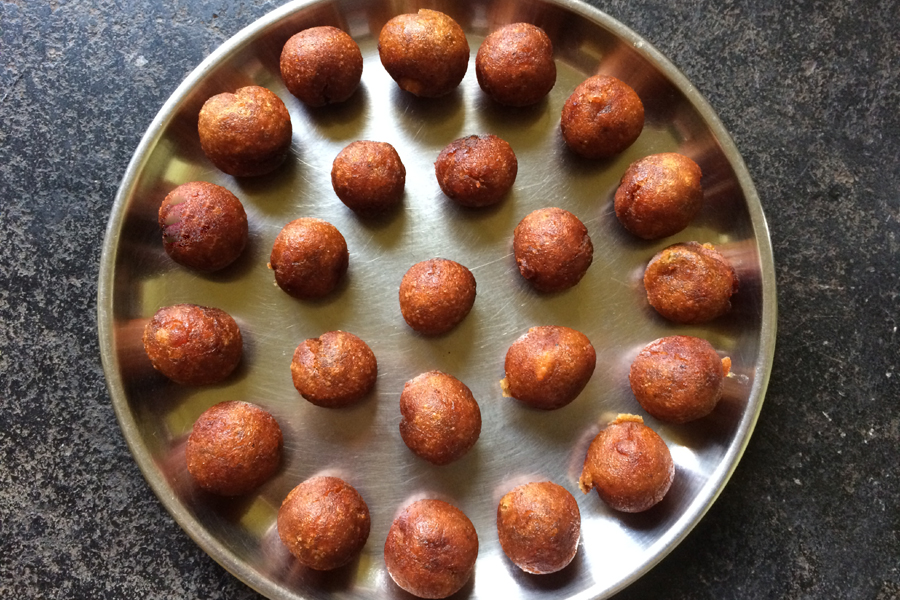
Undlekalu | Jackfruit sweet dumpling
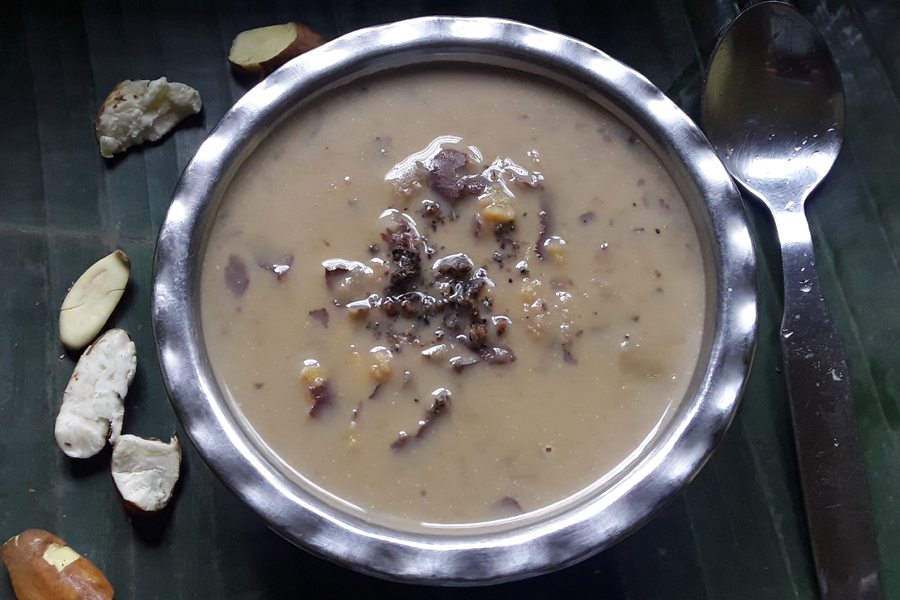
Halasina beejada paayasa | Jackfruit seeds kheer
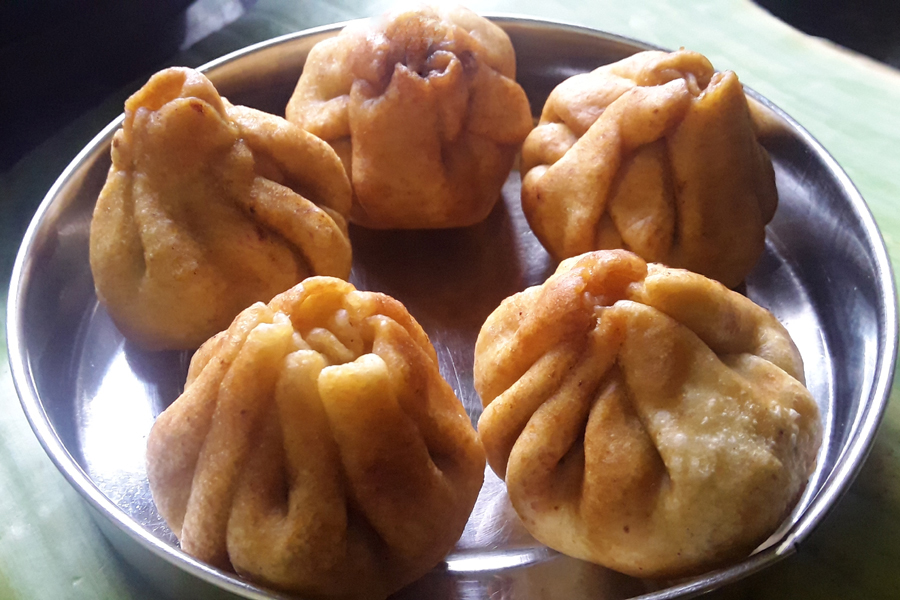
Fried Modaka or Modak
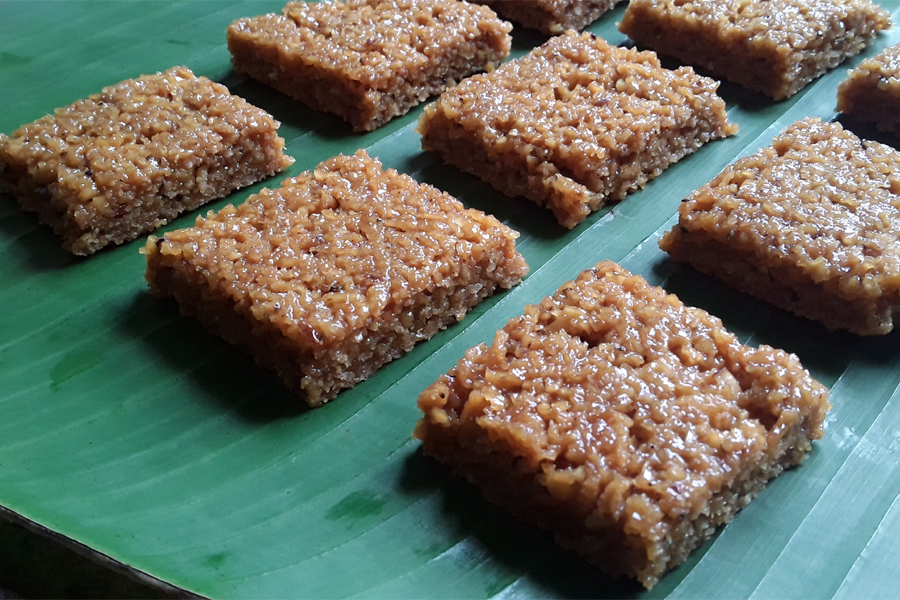
Kaay halwa | Coconut burfi
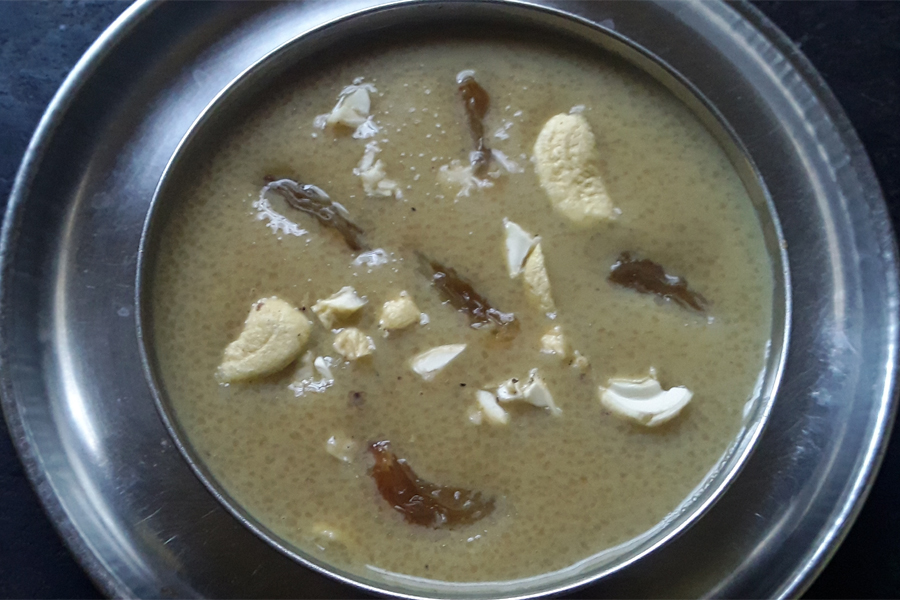
Rava paayasa | Suji or semolina kheer

Sole kochhalu | Raw jackfruit sweet

Mogekaayi paayasa | Mogekaayi kheer

Shabakki paayasa | Sabudana kheer

Govekaayi kadbu | Pumpkin kadbu

Shikarni or Shreekarni | Sweet Mango pulp

Halasina Hannina Kadbu | Jackfruit steamed cake

Haalgumbala paayasa | Bottle gourd kheer

Holige | Sweet stuffed flatbread

Haalgumbala kaayi kadbu | Bottle gourd kadbu

Gajari paayasa | Carrot kheer

Raagi Manni | Finger millet fudge

Hesaru bele paayasa | Moong dal kheer

Ellunde | Til or Sesame seeds laddu
